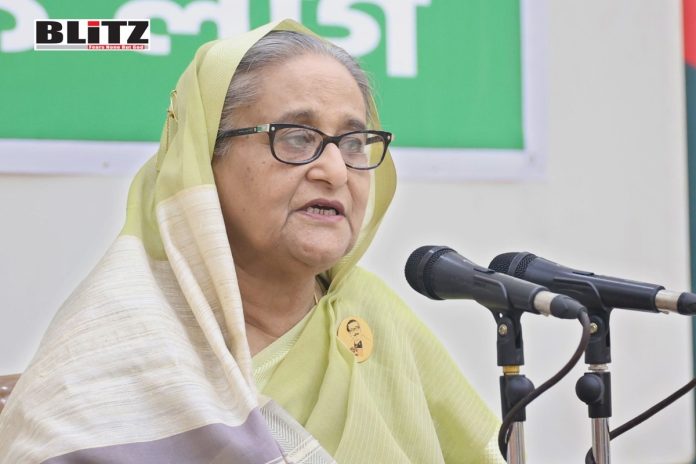During a gathering to mark the 52nd founding anniversary of Bangladesh Krishak League, Prime Minister Sheikh Hasina addressed the central committee members. She categorically asserted that the legal cases against BNP (Bangladesh Nationalist Party) members were not driven by political agendas. Instead, she highlighted that these cases are rooted in specific criminal allegations, which include charges such as arson terrorism, grenade attacks, firearms smuggling, and corruption. Sheikh Hasina’s remarks underscored her commitment to upholding the rule of law and ensuring accountability for criminal actions, irrespective of political affiliations.
The Prime Minister pointed out that BNP members are publicly complaining about the legal cases filed against them. She emphasized that these cases stem from actual crimes committed by them, and appropriate legal actions have been taken in response. Sheikh Hasina reaffirmed the reality of these situations.
She further added, “No case against them (BNP men) is a political one… The cases against them are for different crimes. They committed offenses. So, legal action is being taken against them.”
Highlighting the urgency of disposing of these cases, Sheikh Hasina stressed the importance of ensuring punishment for the crimes committed. She pointed out the violent acts carried out by BNP supporters during previous elections, including the arson violence in 2013 and 2014. During these incidents, they reportedly burnt 3,800 vehicles, including cars, buses, launches, and trains.
Recalling the violence before the 12th parliamentary election, Sheikh Hasina mentioned the 28th October incident where a mother and her child were killed by setting fire to trains to disrupt the polls. She questioned, “Won’t cases be filed against those who committed these things? Would people worship them?”
Addressing the claim made by BNP that 60 lakh of their leaders and workers are in jail, Sheikh Hasina dismissed it as an exaggeration. She pointed out that the country’s jails do not have the capacity to accommodate such a large number of people. She sarcastically remarked, “It means all criminals there (in the jails) belong to BNP,” emphasizing that it would imply all other criminals have been sidelined.
Sheikh Hasina also described the violence and torture experienced by Awami League leaders and activists during the BNP regimes. Despite this, she stated that her government did not seek revenge but focused on developing the country and working for its people.
“It is their good luck that we are in power. They still get scopes to talk (raise voice) as we are not revengeful like them. They talk all day using the loudspeaker and then they say they don’t get the scope to speak,” she said.
President of Bangladesh Krishak League, Samir Chandra, presided over the event where Sheikh Hasina shared her insights. Bangladesh Krishak League, an associate body of Bangladesh Awami League, was established on April 19, 1972.
Shifting her focus to agriculture, Sheikh Hasina stressed the importance of increasing crop production and promoting cooperative agriculture, following the footsteps of Father of the Nation Bangabandhu Sheikh Mujibur Rahman. She emphasized, “Make sure that not a single inch of land remains uncultivated.”
Sheikh Hasina highlighted the potential of cooperative agriculture in protecting vast arable land and eradicating poverty. She also stressed the need for mechanizing agriculture and investing in agricultural research.
“Bangladesh is the most successful in agriculture research. We have to continue the trend of the success,” she said.
The Prime Minister detailed her government’s initiatives in food preservation and food management for the overall development of the agriculture sector. She proudly mentioned that her government has been providing a subsidy of Tk 26,000 crore in agriculture. With various initiatives taken by the Awami League government, food production has seen a significant increase.
Sheikh Hasina also touched upon the changing dietary habits of Bangladeshis, pointing out the shift from primarily thinking about staple foods like salt-rice or pulse-rice to now considering fish-meat-egg as essential. She challenged critics to consider these changes when evaluating the country’s development.
Sheikh Hasina reiterated her commitment to the development of Bangladesh and its people. She emphasized the need for justice, accountability, and progress in all sectors, from law enforcement to agriculture. As the country moves forward, her vision for a prosperous and developed Bangladesh remains unwavering.




